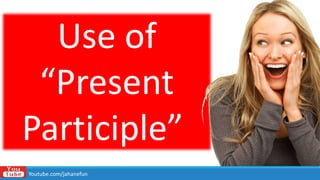Present participle
•Download as PPTX, PDF•
0 likes•6 views
SUBSCRIBE TO MY YOUTUBE CHANNEL https://youtu.be/TUSMKwwu5Xw
Report
Share
Report
Share

Recommended
Recommended
More Related Content
More from FaisalShah66
More from FaisalShah66 (20)
Present participle
- 2. Present Participle مراد سے"verb 1st form+ing"ہےیہ لیکن ،"verb"کے پر طورactایک بلکہ ، تا کر نہیںadjectiveیاnounکے کوئی اور ، ہے تا کر کام پر طور"خوبی"ہے تا کر بیانnoun ۔ کیکسی یاNounبیان کوخوبی کی ہے تا کرایسے ۔۔ گی ہو ہی "Barking Dog"یعنینکتا بھوہواکتایہ ۔۔۔ بھی"کی نکنے بھو لت حا"۔ ہے خوبی کی س ُا بھی
- 3. 1....Present participle as a "Gerund" I heard the baby weeping. میںروتے کو بچے نےہوےناُس۔
- 4. 2....As an adjective A sleeping Kid. A rolling stone Barking dogs سے یا میڈباتئے ہو کرتےنے اسبتایا۔ He told while talking to media. کھاناکرو نہ تیں با ، ہوئے تے کھا Do not talk, while having food.
- 5. …3ہی ایک اگرsubjectلیے کے کام پہلے تو ، ہے ہا ر کر کام دو"present participle"گا۔ ئے ٓا گیا گ بھا چور ہی سنتے شور hearing the noise, the thief ran away. ہو ے کھڑ پے دروازےدیکھا چاند نے میں کر standing at the gate, I saw the moon.
- 6. …4ص خا کچھ"verbs"ساتھ کےpresent participleہمیشہ ہے تا ٓا ہی Keep "Smiling" feel like "eating"
- 7. …5.کچھص خا"adjectives"کے نے بنا لیے working ladies. Interesting match boring drama
- 8. Before....or "after“.6 ہمیشہ بعد کےpresent participle۔ ہے تا ٓا ،بعد کے نے جا ل سکومیں۔ کیا ورک م ہو نے After going to school, I did my homework. کال سے ُاسوچا بہت نے میں پہلے سے نے کر I thought a lot, before calling him
- 9. 1رہیں۔ جاتے آتے گھر ۔میرے 2موبائل وہ ہوے چالتے ۔گاڑی کرتا۔ نہیں استعمال 3۔بھاگتانہ پیچھے کبھی چور ہوایں دیکھتا۔ 4اپنی کبھی سپاہی ہوا لڑتا ۔ایکجان